
°æƒø°øºŸ∂®”¢”ÔøŒ…œ¿œ ¶“™«ÛÕ¨◊¿÷ƺ‰Ωªªª–Þ∏ƒ◊˜Œƒ£¨«Îƒ„–Þ∏ƒƒ„Õ¨◊¿–¥µƒ“‘œ¬◊˜Œƒ°£Œƒ÷–π≤”–10¥¶”Ô—‘¥ÌŒÛ£¨√øæ‰÷–◊Ó∂ý”–¡Ω¥¶£¨√ø¥¶¥ÌŒÛΩˆ…ʺ∞“ª∏ˆµ•¥ µƒ‘ˆº”°¢…æ≥˝ªÚ–Þ∏ƒ°£
‘ˆº”£∫‘⁄»±¥ ¥¶º”“ª∏ˆ¬©◊÷∑˚∫≈£®°ƒ£©£¨≤¢‘⁄∆‰œ¬√Ê–¥≥ˆ∏√º”µƒ¥ °£
…æ≥˝£∫∞—∂ý”ýµƒ¥ ”√–±œþ£®\£©ªÆµÙ°£
–Þ∏ƒ£∫‘⁄¥Ìµƒ¥ œ¬ªÆ“ª∫·œþ£¨≤¢‘⁄∏√¥ œ¬√Ê–¥≥ˆ–Þ∏ƒ∫Ûµƒ¥ °£
◊¢“‚£∫1.√ø¥¶¥ÌŒÛº∞∆‰–Þ∏ƒæ˘œÞ“ª¥ °£
2.÷ª‘ –Ì–Þ∏ƒ10¥¶£¨∂ý’þ£®¥”µ⁄11¥¶∆£©≤ªº∆∑÷°£
Dear Peter,
How are you doing? I am writing to tell you what my uncle Li Ming is going to your city for a conference, and I have asked him bring you the Chinese painting you°Øve asked for ago. Also, I°Ød like you to do me a favor. Would you please meet your uncle at the airport and take him to his hotel since this was his first visit to the U.S.? Thank you in the advance! His flight number is CA985, but it will arrive at 11:30 am, August 6. My uncle is tall and he is worn glasses. And he will be at a blue jacket.
Looking forward to hear from you soon.
Yours,
Li Hua
°æ¥∞∏°ø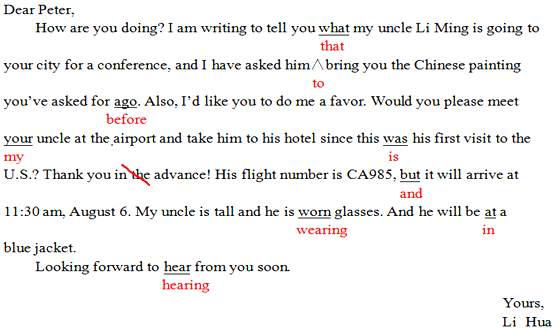
°æΩ‚Œˆ°øµ⁄“ª¥¶£¨øº≤ϱˆ”Ô¥”扵ƒ“˝µº¥ °£What∫Õthat‘⁄“˝µº±ˆ”Ô¥”扵ƒ ±∫Úµƒ«¯± «£¨what‘⁄¥”æ‰÷–≥‰µ±æ‰◊”≥…∑÷£¨≤¢”–“‚“°£∂¯that÷ª±Ì æ¡¨Ω”∫Õ“˝µº£¨≤ª‘⁄¥”æ‰÷–≥‰µ±æ‰◊”≥…∑÷£¨Õ®≥£“≤ø…“‘ °¬‘°£π Ω´what∏ƒŒ™that°£
µ⁄∂˛¥¶£¨øº≤Ï¥ ◊Èask sb. to do sth. ≤ª∂® Ω◊˜±ˆ≤𰣑⁄him∫Õbring÷ƺ‰º”≤ª∂® Ω∑˚∫≈to°£
µ⁄»˝¥¶£¨agoªª≥…before£¨“‚Œ™°∞“‘«∞£¨¥”«∞°±£¨¥À¥¶◊ˆ◊¥”Ô°£
µ⁄Àƒ¥¶£¨øº≤Ï–Œ»ð¥ –‘ŒÔ÷˜¥˙¥ £¨∏˘æð…œœ¬Œƒ£¨”¶Œ™my°£
µ⁄ŒÂ¥¶£¨ ±Ã¨¥ÌŒÛ£¨…œŒƒ÷–ÀµµΩmy uncle is going to your city for a conference£¨À˘“‘¥À¥¶was Ù”⁄ ±Ã¨”√¥Ì£¨”¶Œ™“ª∞„œ÷‘⁄ ±£¨wasªª≥…is°£
µ⁄¡˘¥¶£¨πþ”√∑®°£In advance“‚Œ™°∞÷«∞°±£¨advance«∞Œ™¡„π⁄¥ °£
µ⁄∆þ¥¶£¨¡¨¥ ¥ÌŒÛ°£∏˘æð…œœ¬Œƒ£¨¥À¥¶ «≤¢¡–πÿœµ£¨”¶Œ™and°£
µ⁄∞À¥¶£¨ ±Ã¨±Ì¥Ô¥ÌŒÛ°£∏√¥¶Œ™œ÷‘⁄Ω¯–– ±£¨’˝»∑Ω·ππŒ™be doing£¨À˘“‘∞—worn∏ƒŒ™wearing°£
µ⁄æ≈¥¶£¨πÃ∂®¥Ó≈‰°£±Ì¥Ô°∞ƒ≥»À¥©◊≈¿∂º–øÀ°±£¨”√be in a blue jacket£¨π Ω´at∏ƒŒ™in°£
µ⁄ Æ¥¶£¨∑«ŒΩ”Ô∂Ø¥ µƒŒÛ”√°£Look forward to∂ÔÔ÷–µƒtoŒ™ΩÈ¥ £¨∫ÛΩ”∂Ø¥ ±”√doing£¨π Ω´hear∏ƒŒ™hearing°£



| ƒÍº∂ | ∏þ÷–øŒ≥à | ƒÍº∂ | ≥ı÷–øŒ≥à |
| ∏þ“ª | ∏þ“ª√‚∑—øŒ≥ÃÕ∆ºˆ£° | ≥ı“ª | ≥ı“ª√‚∑—øŒ≥ÃÕ∆ºˆ£° |
| ∏þ∂˛ | ∏þ∂˛√‚∑—øŒ≥ÃÕ∆ºˆ£° | ≥ı∂˛ | ≥ı∂˛√‚∑—øŒ≥ÃÕ∆ºˆ£° |
| ∏þ»˝ | ∏þ»˝√‚∑—øŒ≥ÃÕ∆ºˆ£° | ≥ı»˝ | ≥ı»˝√‚∑—øŒ≥ÃÕ∆ºˆ£° |
ø∆ƒø£∫∏þ÷–”¢”Ô ¿¥‘¥£∫ –գ∫
°æƒø°øºŸ∂®”¢”ÔøŒ…œ¿œ ¶“™«ÛÕ¨◊¿÷ƺ‰Ωªªª–Þ∏ƒ◊˜Œƒ£¨«Îƒ„–Þ∏ƒƒ„Õ¨◊¿–¥µƒ“‘œ¬◊˜Œƒ°£Œƒ÷–π≤”–10¥¶”Ô—‘¥ÌŒÛ£¨√øæ‰÷–◊Ó∂ý”–¡Ω¥¶°£√ø¥¶¥ÌŒÛΩˆ…ʺ∞“ª∏ˆµ•¥ µƒ‘ˆº”°¢…æ≥˝ªÚ–Þ∏ƒ°£
‘ˆº”£∫‘⁄»±¥ ¥¶º”“ª∏ˆ¬©◊÷∑˚∫≈(°ƒ)£¨≤¢‘⁄∆‰œ¬√Ê–¥≥ˆ∏√º”µƒ¥ °£
…æ≥˝£∫∞—∂ý”ýµƒ¥ ”√–±œþ(£Ð)ªÆµÙ°£
–Þ∏ƒ£∫‘⁄¥Ìµƒ¥ œ¬ªÆ“ª∫·œþ£¨≤¢‘⁄∏√¥ œ¬√Ê–¥≥ˆ–Þ∏ƒ∫Ûµƒ¥ °£
◊¢“‚£∫1£Æ√ø¥¶¥ÌŒÛº∞∆‰–Þ∏ƒæ˘ΩˆœÞ“ª¥ £ª
2£Æ÷ª‘ –Ì–Þ∏ƒ10¥¶£¨∂ý’þ(¥”µ⁄11¥¶∆)≤ªº∆∑÷°£
The person who touched me most is an unknown lady. I study in a city school but lives in a village 15 kilometers away. One afternoon, I receive a call from my family saying my mom was serious ill. I hurried to the bus station, only find the last bus had left. Feel anxious, I decided to walk home. On the way a car stopped and the driver asked me that I needed help. Worried about being cheated, I said anything. But she was such sincere that I finally accepted her offer. When we reached my village, it was dark. Seeing her car out of the sight. I was in tear. Whenever I think of her, I always feel grateful.
≤Èø¥¥∞∏∫ÕΩ‚Œˆ>>
ø∆ƒø£∫∏þ÷–”¢”Ô ¿¥‘¥£∫ –գ∫
°æƒø°øTechnological change is everywhere and affects every aspect of life, mostly for the better. However, social changes brought about by new technology are often mistaken for a change in attitudes.
An example at hand is the involvement of parents in the lives of their children who are attending college. Surveys (µ˜≤È) on this topic suggests that parents today continue to be °∞very°± or °∞somewhat°± overly-protective even after their children move into college dormitories. The same surveys also indicate that the rate of parental involvement is greater today than it was a generation ago. This is usually interpreted as a sign that today°Øs parents are trying to manage their children°Øs lives past the point where this behavior is appropriate.
However, greater parental involvement does not necessarily indicate that parents are failing to let go of their °∞adult°± children.
In the context (±≥æ∞) of this discussion, it seems valuable to first find out the cause of change in the case of parents°Ø involvement with their grown children. If parents of earlier generations had wanted to be in touch with their college-age children frequently, would this have been possible? Probably not. On the other hand, does the possibility of frequent communication today mean that the urge to do so wasn°Øt present a generation ago? Many studies show that older parents°™today°Øs grandparents°™would have called their children more often if the means and cost of doing so had not been a barrier.
Furthermore, studies show that finances are the most frequent subject of communication between parents and their college children. The fact that college students are financially dependent on their parents is nothing new; nor are requests for more money to be sent from home. This phenomenon is neither good nor bad; it is a fact of college life, today and in the past.
Thanks to the advanced technology, we live in an age of bettered communication. This has many implications well beyond the role that parents seem to play in the lives of their children who have left for college. But it is useful to bear in mind that all such changes come from the technology and not some imagined desire by parents to keep their children under their wings.
°æ1°øThe surveys inform us of______.
A. the development of technology
B. the changes of adult children°Øs behavior
C. the parents°Ø over-protection of their college children
D. the means and expenses of students°Ø communication
°æ2°øThe writer believes that__________.
A. parents today are more protective than those in the past
B. the disadvantages of new technology outweigh its advantages
C. technology explains greater involvement with their children
D. parents°Ø changed attitudes lead to college children°Øs delayed independence
°æ3°øWhat is the best title for the passage?
A. Technology or Attitude
B. Dependence or Independence
C. Family Influences or Social Changes
D. College Management or Communication Advancement
°æ4°øWhich of the following shows the development of ideas in this passage?
I: Introduction P:Point Sp: Sub-point C: Conclusion
A.  B.
B. 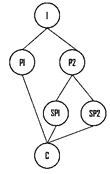
C. 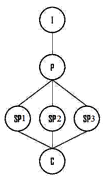 D.
D. 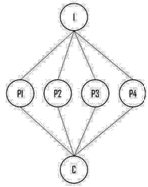
≤Èø¥¥∞∏∫ÕΩ‚Œˆ>>
ø∆ƒø£∫∏þ÷–”¢”Ô ¿¥‘¥£∫ –գ∫
°æƒø°øœ¬√Ê∂ÃŒƒ÷–”–10¥¶”Ô—‘¥ÌŒÛ°£«Î‘⁄”–¥ÌŒÛµƒµÿ∑Ω‘ˆº”°¢…æ≥˝ªÚ–Þ∏ƒƒ≥∏ˆµ•¥ °£
‘ˆº”£∫‘⁄»±¥ ¥¶º”“ª∏ˆ¬©◊÷∑˚∫≈£®°ƒ£©£¨≤¢‘⁄∏√¬©◊÷∑˚∫≈œ¬–¥…œ∏√º”µƒ¥ °£
…æ≥˝£∫∞—∂ý”ýµƒ¥ ”√–±œþ£® \ £©ªÆµÙ°£
–Þ∏ƒ£∫‘⁄¥Ìµƒ¥ œ¬ªÆ“ª∫·œþ£¨≤¢‘⁄∏√∫·œþœ¬–¥…œ–Þ∏ƒ∫Ûµƒ¥ °£
◊¢“‚£∫1°¢√ø¥¶¥ÌŒÛº∞∆‰–Þ∏ƒæ˘ΩˆœÞ“ª¥ £ª
2°¢÷ª‘ –Ì–Þ∏ƒ10¥¶£¨∂ý’þ£®¥”µ⁄11¥¶∆£©≤ªº∆∑÷°£
The other day I happened to meet a young America student in our school. It was the first time that I have met a foreigner, so I went up immediately and greeted him with English. He told me that he was a college student travel in China and he liked China very much. I volunteered to show him around the school. He was deep impressed with the Chinese buildings and was busy taking the photos all the time. He said never had he seen so beautiful buildings. After that, they went boating on the BingXi River and had a wonderful time. I was very glad to have such a good chance to practicing my spoken English.
≤Èø¥¥∞∏∫ÕΩ‚Œˆ>>
ø∆ƒø£∫∏þ÷–”¢”Ô ¿¥‘¥£∫ –գ∫
°æƒø°øSection B £®10 marks£©
Directions: Read the following passage, answer the questions according to the information given in the passage.
Generosity and kindness does not mean that you give only when you have a lot or after fulfilling all your needs, but in fact you can still give when you yourself are struggling. Generosity literally means willingness and liberty in giving away one°Øs own money, time, talent, etc. sincerely without any personal gain as shown in the following story.
Mahatma Gandhi went from city to city, village to village collecting funds for the Charkha Sangh. During one of his tours he addressed a meeting in Orissa. After his speech a poor old lady got up. She was gone with age, her hair was grey and her clothes were in rags. The volunteers tried to stop her, but she fought her way to the place where Mahatma Gandhi was sitting.
°∞I must see him,°± she insisted. She went up to Mahatma Gandhi and touched his feet. Then from the folds of her sari(æÌ≤º), she brought out a copper coin and placed it at his feet. Mahatma Gandhi picked up the copper coin and put it away carefully. The Charkha Sangh funds were under the charge of Jamnalal Bajaj. He asked Mahatma Gandhi for the coin but Mahatma Gandhi refused.
°∞I keep cheques worth thousands of rupees (¬¨±») for the Charkha Sangh,°± Jamnalal Bajaj said laughingly, °∞yet you won°Øt trust me with a copper coin.°± °∞This copper coin is worth much more than those thousands,°± Mahatma Gandhi said. °∞If a man has one hundred thousand rupees and he gives away a thousand or two, it doesn°Øt mean much.°± °∞But this coin was perhaps all that the poor lady possessed. She gave me all she had. That was very generous of her. What a great sacrifice she made. That is why I value this copper coin more than ten millions of rupees.°±
°æ1°øWhat does generosity really mean according to the passage? (No more than 14 words)
_________________________________________________________________________
°æ2°ø What did Gandhi make a speech in Orissa for? (No more than 12 words)
_________________________________________________________________________
°æ3°øWhy did the old lady insist seeing Gandhi? (No more than 10 words)
_________________________________________________________________________
°æ4°øWhy did Gandhi refuse to give the copper coin to Jamnalal Bajaj? (No more than 10 words)
_________________________________________________________________________
ô’‰πÛ¡À£∫Because Gandhi thought it was very valuable.
≤Èø¥¥∞∏∫ÕΩ‚Œˆ>>
ø∆ƒø£∫∏þ÷–”¢”Ô ¿¥‘¥£∫ –գ∫
°æƒø°øºŸ∂®”¢”ÔøŒ…œ¿œ ¶“™«ÛÕ¨◊¿÷ƺ‰Ωªªª–Þ∏ƒ◊˜Œƒ£¨«Îƒ„–Þ∏ƒƒ„Õ¨◊¿–¥µƒ“‘œ¬∂ÃŒƒ°£∂ÃŒƒ÷–π≤”–10¥¶¥ÌŒÛ£¨√øæ‰÷–◊Ó∂ý”–¡Ω¥¶°£¥ÌŒÛ…ʺ∞“ª∏ˆµ•¥ µƒ‘ˆº”°¢…æ≥˝ªÚ–Þ∏ƒ°£
‘ˆº”£∫‘⁄»±¥ ¥¶º”“ª∏ˆ¬©◊÷∑˚∫≈£®°ƒ£©£¨≤¢‘⁄¥À∑˚∫≈œ¬√Ê–¥≥ˆ∏√º”µƒ¥ °£
…æ≥˝£∫∞—∂ý”ýµƒ¥ ”√–±œþ£®£Ð£©ªÆµÙ°£
–Þ∏ƒ£∫‘⁄¥Ìµƒ¥ œ¬ªÆ“ª∫·œþ£¨≤¢‘⁄∏√¥ œ¬√Ê–¥≥ˆ–Þ∏ƒ∫Ûµƒ¥ °£
◊¢“‚£∫1.√ø¥¶¥ÌŒÛº∞∆‰–Þ∏ƒæ˘ΩˆœÞ“ª¥ £ª
2.÷ª‘ –Ì–Þ∏ƒ10¥¶£¨∂ý’þ£®¥”µ⁄11¥¶∆£©≤ªº∆∑÷°£
About one year before, we got a lovely cat named Tom. He enjoys watch my elderly neighbor in her garden. Although he won't let her to touch him, he always keeps an eye on her.
One afternoon I heard Tom calling strange. When I reached the door to check on him, his calling stops, so I headed back to the kitchen. Just as I did, her calling started again. I stepped outside to find Tom sitting next to my elderly neighbors who had fallen. She didn't have strength to get up and shout for help. Tom didn't leave her side until help arrived. With Tom, she might not have been found in time.
≤Èø¥¥∞∏∫ÕΩ‚Œˆ>>
ø∆ƒø£∫∏þ÷–”¢”Ô ¿¥‘¥£∫ –գ∫
°æƒø°øC
Free Fun Guides


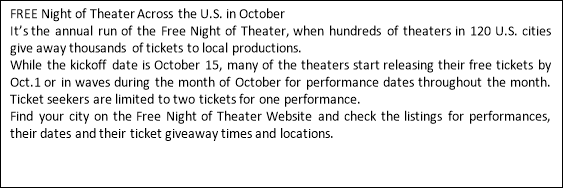
°æ1°øWhat is new about this year°Øs Museum Day?
A. People will get free tickets online.
B. Two museums offer free admission.
C. People must buy tickets for visiting a museum.
D. People can visit museums online and get a small gift.
°æ2°øThe main purpose of the passage is to___________.
A. introduce ways to save money
B. help people who are very poor
C. give guidance on how to have some fun
D. provide information about free things to do
°æ3°øHow can kids get a free book?
A. By reading eighty books at any Barnes & Noble.
B. By downloading and printing out a passport before October.
C. By signing up for a summer reading program and choosing one of the books they have read.
D. By signing up for a winter reading program and make a list of the books.
°æ4°øWhich of the following shows the similarity between Museum Day and Free Night of Theater?
A. They last for the same length of time
B. The same number of free tickets is given away.
C. The tickets can be used in any U.S. city
D. They take place once a year.
≤Èø¥¥∞∏∫ÕΩ‚Œˆ>>
ø∆ƒø£∫∏þ÷–”¢”Ô ¿¥‘¥£∫ –գ∫
°æƒø°øºŸ∂®”¢”ÔøŒ…œ¿œ ¶“™«ÛÕ¨◊¿÷ƺ‰Ωªªª–Þ∏ƒ◊˜Œƒ£¨«Îƒ„–Þ∏ƒƒ„Õ¨◊¿–¥µƒ“‘œ¬◊˜Œƒ°£Œƒ÷–π≤”–10¥¶”Ô—‘¥ÌŒÛ£¨√øæ‰÷–◊Ó∂ý”–¡Ω¥¶°£√ø¥¶¥ÌŒÛΩˆ…ʺ∞“ª∏ˆµ•¥ µƒ‘ˆº”°¢…æ≥˝ªÚ–Þ∏ƒ°£
‘ˆº”£∫‘⁄»±¥ ¥¶º”“ª∏ˆ¬©¥ ∑˚∫≈£®°ƒ£©£¨≤¢‘⁄∆‰œ¬√Ê–¥≥ˆ∏√º”µƒ¥ °£
…æ≥˝£∫∞—∂ý”ýµƒ¥ ”√–±œþ£®\£©ªÆµÙ°£
–Þ∏ƒ£∫‘⁄¥Ìµƒ¥ œ¬ªÆ“ª∫·œþ£¨≤¢‘⁄∏√¥ œ¬√Ê–¥≥ˆ–Þ∏ƒ∫Ûµƒ¥ °£
◊¢“‚£∫1.√ø¥¶¥ÌŒÛº∞∆‰–Þ∏ƒæ˘ΩˆœÞ“ª¥ £ª
2.÷ª‘ –Ì–Þ∏ƒ10¥¶£¨∂ý’þ£®¥”µ⁄11¥¶∆£©≤ªº∆∑÷°£
I°Ød like tell you something about your life in this boarding school. I stay in a dormitory with three other girls£¨all of whom are kind and nice. We get on well to others and have become good friends. Living in a boarding school make me independent. I am confidence to take care of myself, wash the clothes, and clean the rooms, which I never did when at home. The classes here are very interesting and challenged. I°Øm still feeling a little dissatisfied with some other thing. The living conditions are not as good as it at home and the chance to get in touch with the outside world is limited. Anyway, I°Øll get used to live here and hope everything will be more better soon.
≤Èø¥¥∞∏∫ÕΩ‚Œˆ>>
ø∆ƒø£∫∏þ÷–”¢”Ô ¿¥‘¥£∫ –գ∫
°æƒø°øºŸ∂®”¢”ÔøŒ…œ¿œ ¶“™«ÛÕ¨◊¿÷ƺ‰Ωªªª–Þ∏ƒ◊˜Œƒ£¨«Îƒ„–Þ∏ƒƒ„Õ¨◊¿–¥µƒ“‘œ¬◊˜Œƒ°£Œƒ÷–π≤”–10¥¶”Ô—‘¥ÌŒÛ£¨√øæ‰÷–◊Ó∂ý”–¡Ω¥¶£¨√ø¥¶¥ÌŒÛΩˆ…ʺ∞“ª∏ˆµ•¥ µƒ‘ˆº”°¢…æ≥˝ªÚ–Þ∏ƒ°£
‘ˆº”£∫‘⁄»±¥ ¥¶º”“ª∏ˆ¬©◊÷∑˚∫≈£®°ƒ£©£¨≤¢‘⁄∆‰œ¬√Ê–¥≥ˆ∏√º”µƒ¥ °£
…æ≥˝£∫∞—∂ý”ýµƒ¥ ”√–±œþ£®\£©ªÆµÙ°£
–Þ∏ƒ£∫‘⁄¥Ìµƒ¥ œ¬ªÆ“ª∫·œþ£¨≤¢‘⁄∏√¥ œ¬√Ê–¥≥ˆ–Þ∏ƒ∫Ûµƒ¥ °£
◊¢“‚£∫1.√ø¥¶¥ÌŒÛº∞∆‰–Þ∏ƒæ˘œÞ“ª¥ °£
2.÷ª‘ –Ì–Þ∏ƒ10¥¶£¨∂ý’þ£®¥”µ⁄11¥¶∆£©≤ªº∆∑÷°£
Dear Peter,
How are you doing? I am writing to tell you what my uncle Li Ming is going to your city for a conference, and I have asked him bring you the Chinese painting you°Øve asked for ago. Also, I°Ød like you to do me a favor. Would you please meet your uncle at the airport and take him to his hotel since this was his first visit to the U.S.? Thank you in the advance! His flight number is CA985, but it will arrive at 11:30 am, August 6. My uncle is tall and he is worn glasses. And he will be at a blue jacket.
Looking forward to hear from you soon.
Yours,
Li Hua
≤Èø¥¥∞∏∫ÕΩ‚Œˆ>>
∞Ÿ∂»÷¬–≈ - ¡∑œ∞≤·¡–±Ì - ‘¡–±Ì
∫˛±± °ª•¡™Õ¯Œ•∑®∫Õ≤ª¡º–≈œ¢æŸ±®∆Ωî | Õ¯…œ”–∫¶–≈œ¢æŸ±®◊®«¯ | µÁ–≈’©∆≠柱®◊®«¯ | …Ê¿˙ ∑–ÈŒÞ÷˜“”–∫¶–≈œ¢æŸ±®◊®«¯ | …Ê∆Û«÷»®æŸ±®◊®«¯
Œ•∑®∫Õ≤ª¡º–≈œ¢æŸ±®µÁª∞£∫027-86699610 柱®” œ‰£∫58377363@163.com